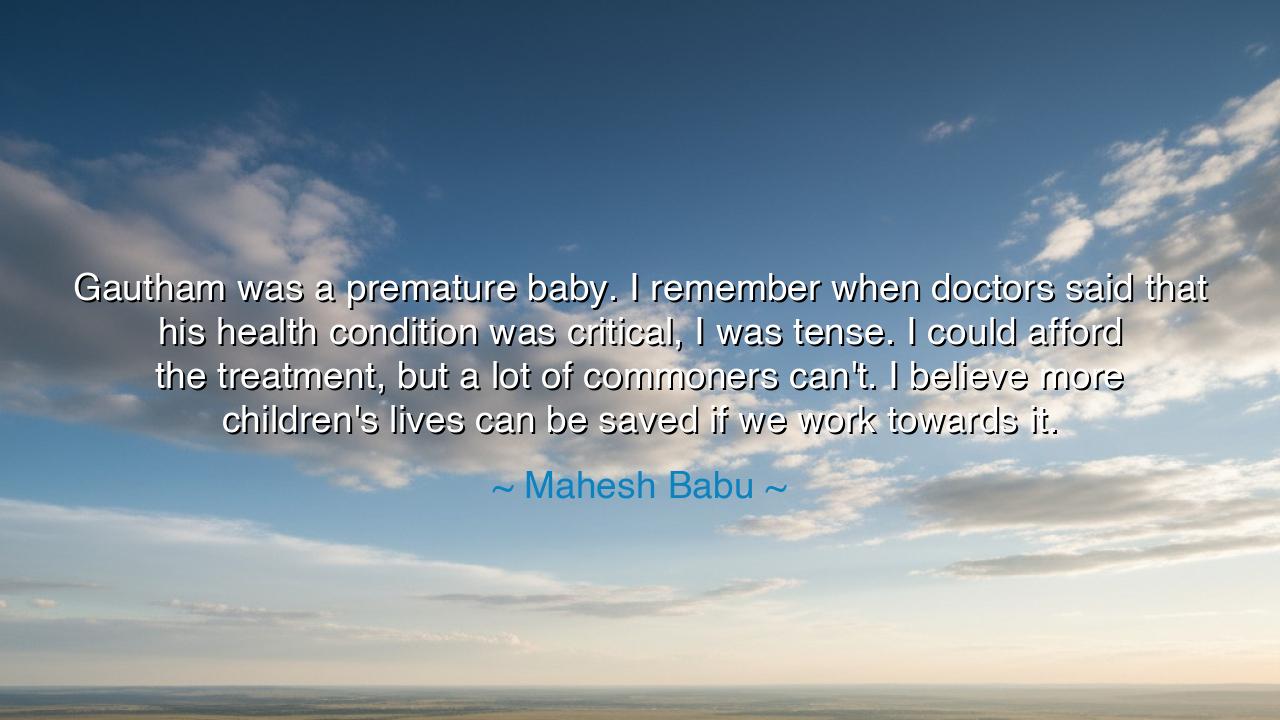
Gautham was a premature baby. I remember when doctors said that
Gautham was a premature baby. I remember when doctors said that his health condition was critical, I was tense. I could afford the treatment, but a lot of commoners can't. I believe more children's lives can be saved if we work towards it.






“Gautham was a premature baby. I remember when doctors said that his health condition was critical, I was tense. I could afford the treatment, but a lot of commoners can't. I believe more children's lives can be saved if we work towards it.” Thus spoke Mahesh Babu, a man known to the world for his art and fame, yet who, in this moment, spoke with the voice of a father—raw, vulnerable, and profoundly human. His words, though tender and personal, carry the weight of universal truth: that compassion must move beyond sentiment, that privilege must be turned into purpose, and that the true measure of fortune lies not in what we possess, but in what we share with those in need.
In this reflection, Mahesh Babu reveals not the grandeur of celebrity, but the humility of experience. For when his child, Gautham, was born into fragility, he faced the same fear that unites all parents—the terror of loss, the helplessness before fate. Yet he was spared the crueler anguish that many endure, for he had the means to save his son. In that realization, compassion was born—not of pity, but of recognition. He understood that countless others, though equal in love and devotion, are separated from hope only by circumstance. His statement thus becomes not a boast, but a pledge, a call to awaken the moral duty of those who can help to do so.
The ancients would have recognized this as the birth of nobility of spirit—the moment when personal suffering is transmuted into collective care. Just as Ashoka the Great, once a conqueror drenched in blood, turned from war to compassion after seeing the suffering of others, so too does Mahesh Babu transform a moment of private trial into a public vow to serve. This is the essence of moral evolution: to take one’s own pain and use it as fuel for the healing of others. The wise know that empathy without action is mere sentiment, but when joined with purpose, it becomes divine.
Consider, too, the story of Florence Nightingale, who walked among the wounded soldiers of the Crimean War. She saw not only their suffering but the injustice that caused it—the neglect of those deemed too common to matter. She used her privilege and education to build systems of care, saving countless lives. Like Mahesh Babu’s insight, her work arose from the recognition that compassion is most powerful when it is structured—when it becomes not just feeling, but action; not just emotion, but reform. Through such courage, individual kindness becomes the foundation of civilization itself.
Mahesh Babu’s words remind us that wealth, fame, and influence are not ornaments, but tools—sacred instruments to ease the suffering of others. He understood that while he could save his own child, the world would be brighter if every child were given that same chance. The health of children, he implies, is the heartbeat of humanity. When a child dies from preventable causes, it is not fate that fails, but society. To save one child is an act of love; to strive to save many is an act of leadership. Such is the legacy of compassion elevated to purpose.
Yet, beyond the fame of the speaker, the quote calls upon all who hear it to act within their own means. For not all can build hospitals or fund great causes, but all can care, support, and speak for those who cannot speak for themselves. Even the smallest gesture—a donation, a conversation, a hand extended to the weary—ripples through the fabric of the world. The ancients taught that a single drop of water can create circles across the still pond; so too can one act of mercy ignite the spirit of a nation.
Let this be the lesson drawn from Mahesh Babu’s reflection: that compassion is not the duty of the wealthy alone, but the inheritance of every heart. Let those who have resources use them wisely; let those who have voices use them boldly; and let those who have love spread it without boundary. For the life of a single child carries the promise of a thousand futures, and every act that preserves that promise is sacred.
So remember, O listener, the quiet power of these words: “I believe more children's lives can be saved if we work towards it.” This is not mere optimism—it is prophecy. It calls upon all who live in comfort to become guardians of the vulnerable. If each person worked toward this vision, no child would die for want of care, no parent would weep for what could have been saved. Thus, let compassion become your creed and service your song. For in saving the smallest among us, we preserve the noblest part of ourselves—and the world becomes, at last, worthy of its children.






AAdministratorAdministrator
Welcome, honored guests. Please leave a comment, we will respond soon